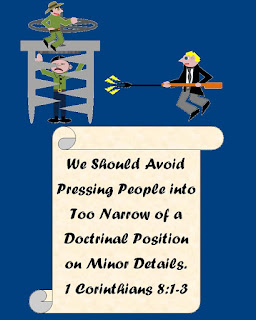Ratramnus was an obscure person by most standards. He was a monk in the monastery of Corbie in Picardy and seems to have done nothing notable except writing on theological subjects. But he had a hand in several of the theological controversies of his day.
He was involved in the controversy on the nature of the presence of the Lord in the Lord's Supper. Earlier writers leaned in various directions on this issue. But it was not a clear matter of contention. One person who took a specific position on the subject was Augustine of Hippo, who held to a more spiritual view of the presence but did not claim others were required to hold his view. I would agree with this approach. The Scripture does not clearly teach on this one way or the other, and I am against being dogmatic on it. But Rabertus Paschasius argued dogmatically that Christ had to be physically present. Ratramnus argued against this. Thus the issue became a matter of controversy. While I am not dogmatic on the nature of the presence, an emphasis on the physical view can lead to a magical view of the Supper, that emphasizes the physical action rather than what is in the heart of the worshiper. It can also end up focusing on the authority of the person administering the sacrament rather than the faith of the recipient. In this, Ratramnus was important in making sure this idea was not accepted without opposition.
Ratramnus also got involved in the dispute over predestination, another of the views maintained by Augustine. The center of this controversy was a monk named Gottschalk. He held firmly to the Ausgustinian view of predestination. Gottschalk was condemned by his immediate superiors, beaten and imprisoned. It did not help that he had earlier asked to be released from being a monk since he was made one as an infant without his consent. Gottschalk appealed to the pope, but his appeal was not heard before his death. But Ratramnus defended Gottschalk's position, and different individuals and councils took different positions. This issue continues to be a point of contention today, but Ratramnus stood against the extreme dogmatism that was shown at this time by the opponents of predestination.
Ratramnus was also involved in defending the Western Church regarding the Eastern Church's charges against it. I will have more to say about this conflict, which ultimately led to the division into the Roman Catholic and Eastern Orthodox churches, in a later post. But Ratramnus was in the center of this contention.
In all, Ratramnus, while he was not able to stop it, stood against a hardening dogmatism on certain issues which would later come to dominate the Medieval church's position on these subjects. And he did so by sticking to the issues and not involving himself in names and personalities. It is a shame they could not agree to disagree on these issues and avoid some of the later more serious struggles over them.
a prayer to find rest
12 hours ago




No comments:
Post a Comment